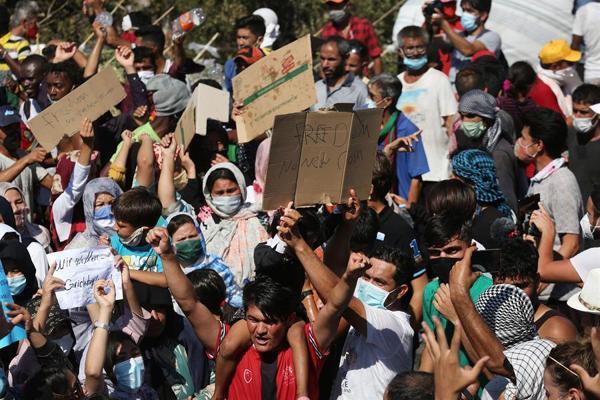Thousands protest after Greek refugee camp burns down
MYTILENE- The Associayed Press


Thousands of refugees and migrants left without shelter on the Greek island of Lesbos after fires destroyed the overcrowded Moria camp held a brief protest on Sept. 11 on a road to the island’s main town, demanding to be allowed to leave.
Clapping, chanting songs and dancing, the protesters were boisterous but peaceful. Some held signs pleading for help from Germany, a favored destination for many who arrive in Greece from the nearby Turkish coast.
Greek officials said the fires on Tuesday and Wednesday were deliberately set by some of the camp’s residents angered by isolation orders issued to prevent the spread of the coronavirus after 35 residents were found to have been infected.
They have said that none of the camp’s residents - except for 406 unaccompanied teenagers and children- would be allowed to leave the island. The unaccompanied minors were flown to the Greek mainland on Wednesday.
Prime Minister Kyriakos Mitsotakis said Greek authorities have “moved very fast” and are working on a temporary facility to shelter the residents from the gutted camp.
More than 12,000 people who had been living in and around Moria slept in the open for a third night, setting up makeshift roadside shelters blankets, salvaged tents and reeds.
The camp had been under a lockdown until mid-September after the first virus case was identified in a Somali man who had been granted asylum and left the camp but later returned to Moria from Athens.
The World Health Organization said Greece had asked for the deployment of an emergency medical team. Two such teams, one from Belgium and one from Norway, were to arrive Saturday and Monday, WHO spokesperson Fadela Chaib said in Geneva.
“WHO is ready to send medical supplies, as needed. This is to supplement existing services which have been partly disrupted,” Chaib said.
The United Nations refugee agency said the pandemic is adding to "an already desperate situation.”
"UNHCR has advised all those previously staying in the (camp) to restrict their movements until temporary solutions are found,” it said. The advice appeared to be largely ignored.
“We have spent three days here without eating, without drinking. We are in conditions that are really, really not very good,” said Freddy Musamba, from Gambia ,who denounced the situation in Greece and the living conditions.
“I want to speak about the European Union, who abandoned us, who left us here like this,” Musamba said. He called for the EU “to come and support us, to not leave us. We are like abandoned children. We have endured things we didn’t know could happen.”
Aid organizations have long warned about dire conditions in the camp, which has a capacity of just over 2,750 but had more than 12,500 living in and around the facility.
The situation has led to spiraling tension, both among those in the camp and with islanders who have called for Moria to be shut down.
Moria houses people from Africa, Asia and the Middle East who crossed illegally from Turkey fleeing poverty or conflict in their homeland. Under a 2016 deal between the EU and Turkey, those arriving on Greek islands would remain there pending either their successful asylum application, or deportation back to Turkey.
But a backlog in asylum applications, combined with continued arrivals and few deportations, led to massive overcrowding. Critics say the camp is a symbol of failures in the EU’s migration and refugee policy.
“Moria is a sharp reminder to all of us for what we need to change in Europe,” said European Commission Vice President Margaritis Schinas, who also handles migration for the 27-nation bloc.
“The clock has run out on how long Europe can live without a migration policy,” said Schinas, who was in Greece to discuss the Moria fire with Greek officials. The EU’s executive commission plans to present a new “pact for migration and asylum” on Sept. 30.
Prime Minister Mitsotakis said Athens awaits the commission’s proposals “with great interest.”
“And perhaps such a tragedy (as Moria) is needed to awaken consciences so that everybody in Europe realizes that management of the problem cannot just fall upon ... countries on Europe’s external borders,” he said during a meeting with Schinas.
According to Schinas, the pact will foresee agreements with migrants’ countries of origin and transit to persuade people not to head for Europe, as well a “robust” system to manage the EU’s external borders, including “a new European border and coast guard, with many more staff, boats, instruments and tools.”
It will include “a system of permanent, effective solidarity in shouldering the responsibility of asylum” among EU countries, Schinas said.
On Thursday, French President Emanuel Macron announced that France and Germany were in talks to take in some of the children from Moria.
German Interior Minister Horst Seehofer said 10 EU countries had agreed take in unaccompanied children from Moria and that talks were ongoing with others. He said Germany and France would take “about two-thirds.”
German officials identified the other countries as Finland, Luxembourg, Slovenia, Croatia, the Netherlands, Portugal, Belgium and Switzerland.
Finland said it would take 11 children, who would be among the 175 particularly vulnerable asylum-seekers from the Mediterranean region the government had already decided to take in last spring.
Switzerland, which is a member of Europe’s passport-free Schengen travel zone though not part of the EU, said it plans to take in about 20 children.
However, because the children have already been taken off the island and provided accommodation elsewhere, the pledges don’t address the immediate need of more than 12,000 people on the island and in need of emergency housing.
A program was already in place for several European countries to take in some of the thousands of unaccompanied minors, mostly teenagers, in refugee and migrant facilities across Greece.
